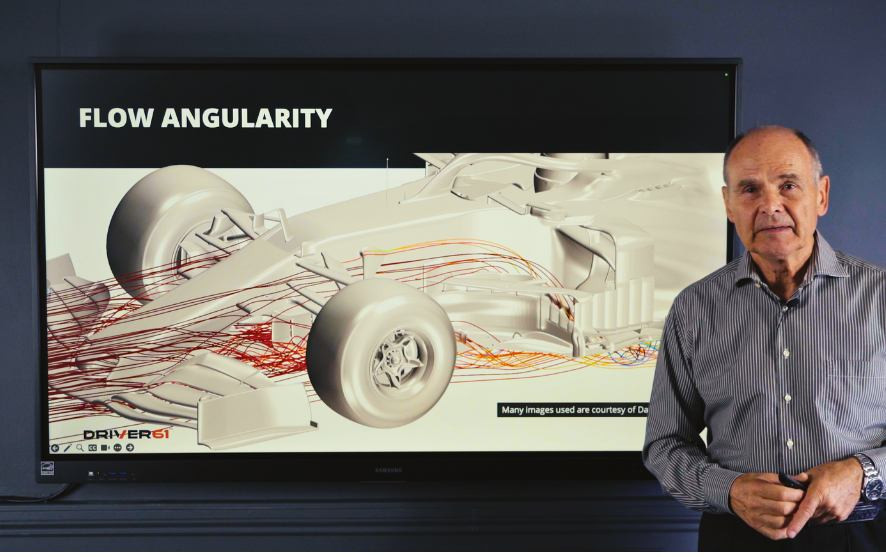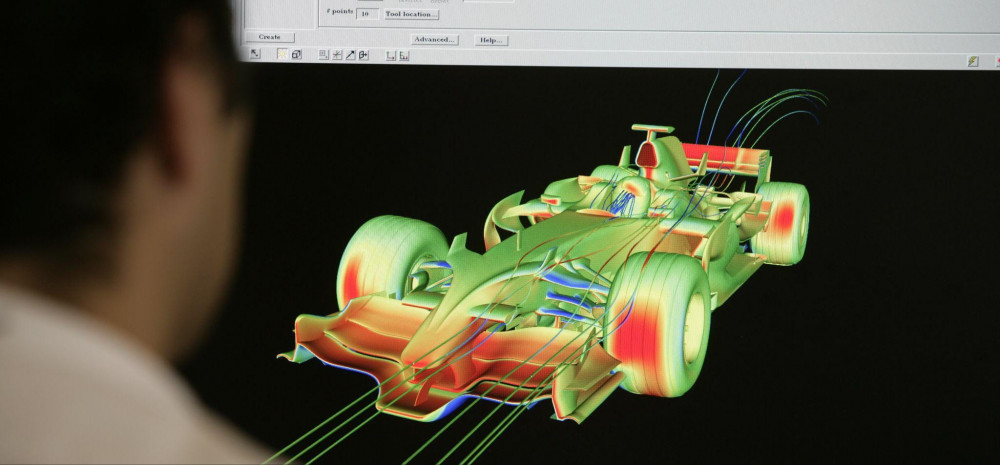Breaking into the world of Formula 1 is a dream for many motorsport enthusiasts, and securing an internship is often the first step towards that goal.
In today’s guide, I’ll walk you through the process of landing an F1 internship (view our latest internship roles here), to building your professional profile and finally, standing out while you extract the maximum possible value from your student placement.

(Image source: Mercedes AMG F1)
What types of Internships are available in F1?
The short answer is there are many! It’s easy to think of an internship in a Motorsport environment as being close to the races themselves: race engineers and mechanics. This isn’t entirely the case, F1 teams offer varied internships across multiple departments. Yes, there are probably more engineering internship opportunities in aerodynamics, vehicle dynamics, and manufacturing, but Motorsport organisations are companies with a broad range of functions.
You might find opportunities in non-engineering fields such as HR, marketing, accounts and finance, events management, and PR.
(How to get a job in F1: Driver61)
F1 team internships usually come in two forms: Summer placements lasting 2-3 months, and year-long industrial placements. The latter are often part of university sandwich courses (so choose your University wisely) but be warned: achieving these placements is incredibly competitive. Expect to work hard to win the right opportunity.
Your educational background
Engineering related F1 internships naturally require a relevant degree and more so, an MSc.
Disciplines considered are rich and varied: electronic engineering, aerospace, software development and automotive engineering. STEM subjects like physics and data science are also very attractive to teams, particularly as wind tunnel time and CFD compute time is limited; the name of the game is efficiency.

(Source: Postgraduate Motorsport Engineering course at Oxford Brookes)
As a piece of advice, use your time at University to focus on modules that will interest F1 teams. Even if you don’t specialise in pure aerodynamics or materials science, a broad understanding of the subjects will pay dividends as F1 teams have high levels of inter-departmental collaboration.
Being able to empathise with each engineer’s individual objectives is a powerful communication skill. Additionally, it’s important to develop expertise in industry-standard software platforms like CATIA, MATLAB, and CFD tools such as ANSYS Fluent.
Build a first-class candidate profile
To stand out and be seen, the degree is only part of the package. Your background experience, hobbies, interests and personal characteristics are just as important. If you want to present yourself as the complete package, here’s some advice:
1. Get Involved with Formula Student: Formula Student is an international competition that gives university students the opportunity to design, build, and race a single-seater car in a regulations-driven environment. Formula Student is considered one of the main entrance paths to Motorsport. Even if you don’t continue a career in racing; gaining hands-on experience in this space is valuable in aerospace and automotive engineering too.

(Source: How Formula Student Innovates beyond F1)
2. Personal projects: Most of the best engineers I know have their own hobby projects. This could be anything from designing aerodynamic components to creating simulation models or building your own racing cars!
3. Develop an awareness of common software packages in Motorsport: Master the relevant software tools to your degree. CAD programs like CATIA or Siemens NX, CFD software like ANSYS Fluent, and programming languages such as Python are prolific in F1 and will be a part of your daily routine.
4. Get some work experience: Any experience in the automotive or engineering sector will help. Even when it's not directly related to F1, it shows your commitment and ability to work in a professional environment. Turn up at Motorsport events and be willing to find the team manager and ask if you can be of any help. Particularly in the lower categories, teams will be open to skilled individuals lending a hand for free at the weekend.
What does an intern application process look like?
Most F1 teams open their internship applications in autumn for placements starting the following summer or academic year. Here are some tips for the application process:
1. CV and cover letter: Tailor these documents to each specific role. Highlight relevant projects, skills, and experiences. Be concise but impactful.
2. Online assessments: Many teams use online tests to assess candidates' technical knowledge and problem-solving skills. Practice these in advance.
3. Interviews: If successful, you'll likely face both technical and HR interviews. Be prepared to discuss your projects in detail and demonstrate your passion for F1.
4. Assessment centres: Some teams use group exercises to evaluate teamwork and communication skills. Practice working in teams and presenting your ideas clearly.
What to Expect and Key Characteristics for Success
Working in F1 is not for the faint-hearted. It's a high-pressure environment with long hours and tight deadlines. However, for those passionate about motorsport, it can be incredibly rewarding.

(Source: Julien Simon-Chautemps' Guide to Motorsport Success)
Here are some key traits you'll need:
1. Passion: A genuine enthusiasm for motorsport and engineering is essential. This passion will fuel you through challenging times.
2. Resilience: You'll face setbacks and failures. The ability to bounce back and learn from these experiences is crucial.
3. Problem-solving skills: F1 is all about finding innovative solutions to complex problems. You need to be creative and analytical.
4. Teamwork: While technical skills are important, the ability to work effectively in a team is equally vital. Communication skills are key.
5. Adaptability: The F1 world moves quickly. You need to be able to adapt to new challenges and technologies rapidly.
Remember, even as an intern, you'll be expected to contribute meaningfully to the team. Be prepared to work hard and take on significant responsibilities.
Making the Most of Your Internship
Once you've secured an internship, here's how to make the most of it:
1. Be proactive: Don't wait to be given tasks. Look for opportunities to contribute and learn.
2. Ask questions: Don't be afraid to ask for clarification or more information. It shows you're engaged and eager to learn.
3. Network: Build relationships with your colleagues. These connections can be valuable for your future career.
4. Seek feedback: Regularly ask for feedback on your performance and act on it.
5. Document your work: Keep a record of your projects and achievements. This will be useful for future job applications.
From internship to your first full-time role
F1 teams use their internship programmes as a pipeline for full-time talent and all organisations have a corporate social responsibility to diversity and equal opportunities. Put simply, F1 organisations want to help, but you have to stand out.
Here are some key pointers to follow if you want to increase your chances of securing a permanent role with a Formula One team:
1. Exceed expectations: Always go above and beyond in your assigned tasks. Find out “what good looks like” fo you fully understand those expectations.
2. Seek feedback: the best people actively seek, and act upon feedback. It’s the fastest way to improve and put simply, it’s free training!
3. Fit into the team culture: Demonstrate that you can work well with others and adapt to the team's working style.
4. Seek a mentor – ask if there are any individuals in the organisation that you could meet with occasionally to discuss your experiences so far and seek guidance for your next steps.
Alternative paths that can lead to working in F1
You might not be able to secure an F1 internship on your first attempt. See this as an opportunity to demonstrate your resilience and perseverance. And rest assured there there are always other ways to gain relevant experience:
1. Seek out opportunities within other series: Make contact with teams in other racing series like Formula E, WEC, or national championships such as the BTCC.
2. Automotive industry internships: Experience in road car development can be relevant to F1, particularly suspension design, testing, manufacturing and assembly processes.
3. Aerospace industry: Many skills from aerospace engineering transfer well to F1 and in fact, many aerodynamicists in Formula One began their careers in Aerospace.
4. Keep applying: F1 teams receive many applications. If you're not successful one year, improve your profile and try again.
Challenging, but achievable for the right people
Securing an F1 internship is challenging but achievable with the right preparation and mindset.
Focus on building a strong technical foundation, gaining relevant experience, and developing the personal qualities needed to thrive in this fast-paced environment.
Remember, persistence is key. Even if you don't succeed immediately, each application and experience brings you one step closer to your F1 dream.
Resources / Further reading:
https://www.youtube.com/watch?v=zcgA3UeW8WY
https://www.calstate.edu/CSUEA/Documents/Employer%20Advice_CSUEA.pdf
https://www.redbull.com/gb-en/how-to-get-started-in-formula-one




